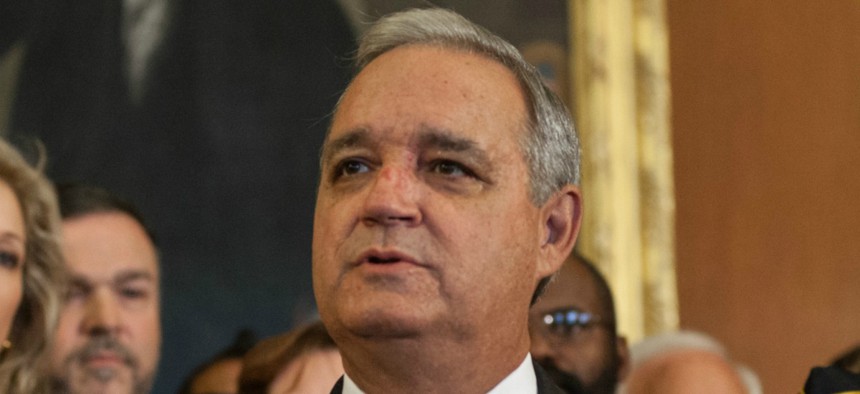
Rep. Jeff Miller, R-Fla., is sponsoring the bill. Caleb Smith / John Boehner
New Bill Strips Bonuses and MSPB Appeal Rights From VA Senior Executives
House legislation also includes more accountability measures for all employees.
A new accountability bill aims to make it easier to fire and demote all Veterans Affairs employees, and would prevent department senior executives from receiving any bonuses over the next five years.
The 2016 VA Accountability First and Appeals Modernization Act is the latest effort by lawmakers to change the disciplinary process for VA employees and top career officials, essentially by reducing the time allotted for it to play out. The measure also would give the secretary clear authority to rescind bonuses, retirement benefits and relocation expenses from employees under certain circumstances.
Additionally, the legislation would prohibit all VA senior executives from receiving awards or bonuses from fiscal 2017 through 2021.
Under the bill (H.R. 5620), rank-and-file employees who have been fired because of performance or misconduct, and appeal that decision to the Merit Systems Protection Board, would not receive pay, bonuses, or certain other benefits while the appeal is pending. Senior executives would no longer be able to appeal removals or demotions to MSPB; instead they could appeal to an internal Senior Executive Disciplinary Appeals Board. But the secretary could reverse that board’s decision.
“The biggest obstacle standing in the way of VA reform is the department’s pervasive lack of accountability among employees at all levels,” said the bill’s sponsor, House Veterans’ Affairs Committee Chairman Jeff Miller, R-Fla. “For too long, union bosses, administration officials and their enablers have used every trick in the book to help VA bureaucrats who can’t or won’t do their jobs remain firmly entrenched in the agency’s bureaucracy.”
Miller, one of the chief architects of the 2014 Veterans Access, Choice, and Accountability Act – the law which tried to make it easier to fire VA senior executives -- has introduced several measures over the last few years that incorporate many of the provisions in H.R. 5620. The Justice Department recently said it could not enforce a key accountability component of the 2014 law, prompting the VA to announce it would no longer use the Choice Act’s expedited firing authority for senior executives.
Miller’s latest bill also attempts to strengthen whistleblower rights, and would withhold bonuses from managers who don’t treat whistleblower complaints seriously, or who retaliate against such employees. H.R. 5620 also contains a section that aims to fix the lengthy and complicated disability claims process for veterans.
The major employee accountability provisions in the bill would:
- Impose a shorter disciplinary process for rank-and-file employees who are fired or demoted. The entire process – from notification to the MSPB’s decision on an appeal – would be limited to 77 days.
- Give the VA secretary authority to strip pension benefits from VA senior executives who are convicted of a crime that influenced their job performance, and then fired. The bill also would prevent senior executives about to be fired because they were convicted of such a felony, but who instead retire, from receiving their full retirement benefits. The secretary would be allowed to take away the government contribution portion of the pension for the time period in which the employee was engaged in behavior warranting removal.
- Allow the VA secretary to recoup bonuses from VA employees when appropriate, with notification and an opportunity for appeal.
- Allow the VA secretary to recoup relocation expenses from VA employees who’ve engaged in misconduct, with notification and opportunity for appeal.
Miller’s bill contains provisions that are similar to the Senate’s Veterans First Act, most notably the elimination of MSPB appeal rights for senior executives. But the House legislation contains measures that target the pay and benefits of problem rank-and-file employees, not just senior executives. The Veterans First Act, which has stalled in the upper chamber, also would reduce the amount of time an employee has to respond to proposed disciplinary actions. But earlier versions of that bill contained some stronger accountability measures for the rank-and-file that didn’t make it into the final legislation. The Senate bill also includes more hiring and pay flexibility for the VA to recruit health-care professionals, measures that are not in the House legislation.
Jason Briefel, interim president of the Senior Executives Association, said he needed to look more closely at H.R. 5620 to see if some of the group’s previous recommendations on issues affecting VA senior executives made it into the bill. “We’re not just here to say ‘no,’” Briefel said. “We are here to work with the Congress, and we do want to help find good policy for employees writ large,” whether they are senior executives or not, Briefel added.
Briefel said lawmakers need to ask themselves whether or not “a sticks-only approach” to personnel ultimately will result in the type of leadership that VA needs to succeed. “Part of what we hope to continue doing is educating members of Congress about what the real facts are.”
The American Federation of Government Employees, which represents a large portion of the VA workforce, said keeping the department accountable called for stronger, not weaker, due process rights for employees.
“Real accountability at the VA comes when front-line employees are empowered to speak out about issues with veterans’ health care and benefits," said AFGE National President J. David Cox Sr. "Chipping away at vital due process rights leaves these employees more exposed to retaliatory acts, cutting off a vital feedback channel for improving veterans’ care." Cox added that "whistleblower protections can only do so much to right these wrongs."
AFGE supports the Senate's Veterans First Act.







